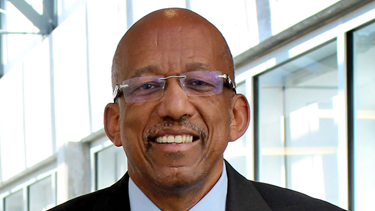Dean Alfred Mathewson moderates tax law panel, files sports law amicus brief
November 14, 2016 - Tamara Williams

For years,UNM Law School Dean Alfred Mathewsonhas focused his teaching and research on antitrust law, business planning, sports law, minority business enterprises and corporate governance.
Two recent news items demonstrate his continued focus in these areas.
On October 7, he moderated a panel at the University of Washington School of Law Fourth Annual Tax Symposium.
On October 13, he joined a group of prominent sports and labor law professors led by Professor Stephen Ross of Penn State to file an amicus brief in United States Soccer Federation v. United States National Soccer Team Players Association. The case involves a dispute between the United States Soccer Federation, Inc. (USSF), the national governing body for soccer in the United States, against the United States National Soccer Team Players Association (Players Association), the union representing members of the Men's National Team.
From 2001 to 2013, the USSF presented creative advertisements featuring player images in groups of six or more to the Players Association for approval.
In 2013, when the Players Association disapproved a proposed tequila poster advertisement, the USSF responded by notifying the Players Association that the express terms of the Collective Bargaining Agreement (CBA) and Uniform Players Agreement (UPA) did not require Players Association approval for use of player images in groups of six or more players in print advertisements by sponsors.
The Players Association filed a grievance arguing that under the CBA/UPA, preapproval was contractually required, based on the past practice of the parties. The arbitrator ruled in favor of the Players Association. The district court confirmed the arbitrator's award and the Seventh Circuit Court Appeals reversed. The amicus brief was in support of a petition for rehearing filed by the Players Association.
“The timing of the brief coincided with the coverage of the judicial review of labor law arbitration in my Sports Law class,” says Mathewson. “It was a great teaching moment as students played the roles of arbitrators and reached the opposite conclusion than that rendered by the actual arbitrator. The issue was not whether he was correct but whether the court should have given deference to him. ”
He quotes from the motion to file the amicus brief:
The writers of the amicus brief take no position on the merits of the underlying dispute between the parties. “However, in holding that federal judges may, by substituting their own conclusion that a collective bargaining agreement's text is "plain" from the carefully considered decision by an expert hand-picked arbitrator that the text is "ambiguous," we believe that the Panel decision creates an unwarranted and novel exception to six decades of jurisprudence. Our short amicus brief explains the damage that this precedent would cause to the dynamics of collective bargaining in sports.
Nevertheless, the Seventh Circuit denied the Players Association petition for rehearing.
